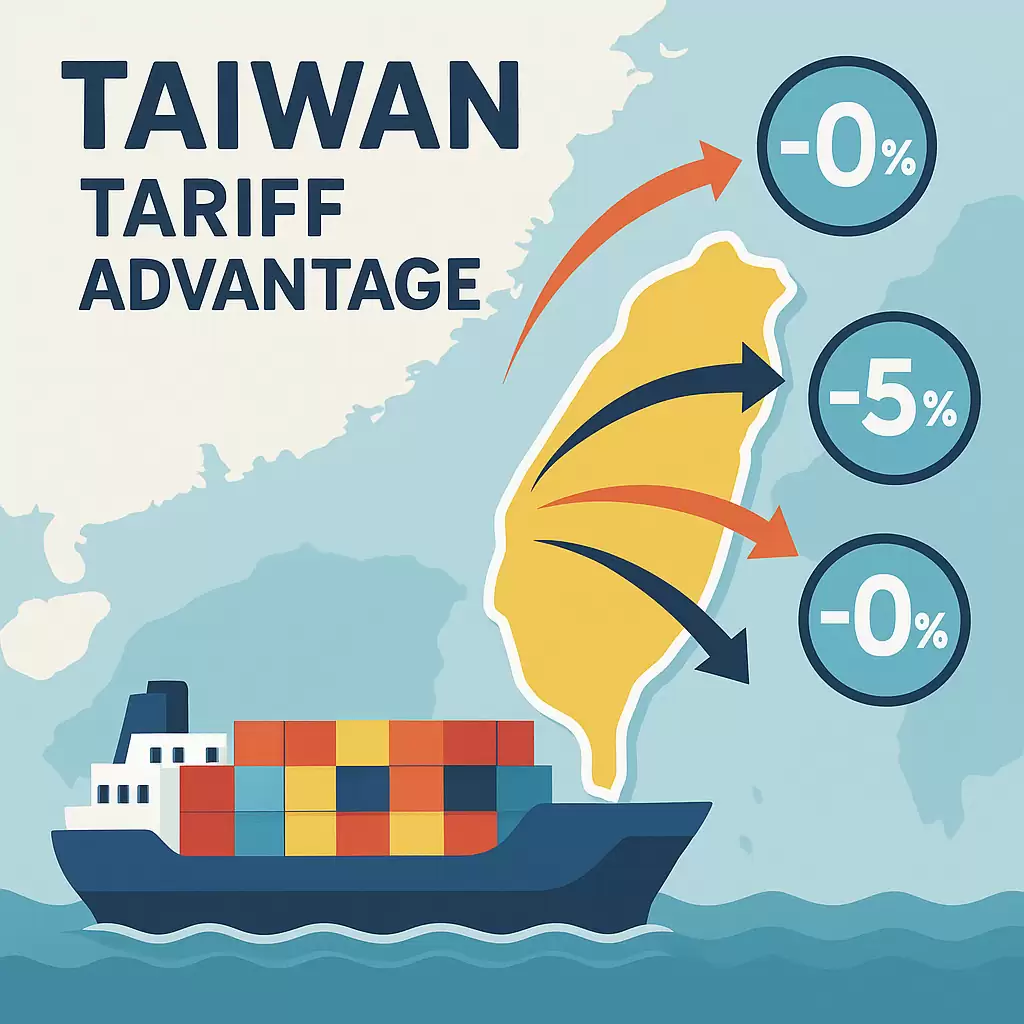Taiwan’s Tariff Advantage: How “Made in Taiwan” Lowers Landed Costs and Strengthens Global Supply Chains
Taiwan’s Tariff Advantage: How “Made in Taiwan” Lowers Landed Costs and Strengthens Global Supply Chains

Taiwan has long been a trusted hub for high‑precision manufacturing, but its appeal extends well beyond engineering expertise. For importers in the United States, Europe, Japan, and Southeast Asia, sourcing from Taiwan often translates into meaningful tariff savings compared with buying the same goods from higher‑duty regions such as mainland China or certain developing economies. Below, we break down the key reasons Taiwan delivers a customs‑driven cost edge—and what this means for companies purchasing plastic injection‑molded parts, electronics, machinery, and other industrial products.
1 | Exemption from U.S. Section 301 Tariffs
-
Since 2018, most China‑origin mechanical and plastic components shipped to the United States face 25 % Section 301 duties.
-
Goods of Taiwanese origin, by contrast, continue to enter under standard MFN (Most‑Favoured‑Nation) rates—often 0–5 % for common plastics and metal parts.
-
Result: landed‑cost reductions of 20–25 % versus China for many HS codes (e.g., HS 3926, HS 7326, HS 8536).
Example: Injection‑molded PC housings (HS 3926.90)
| Origin | Base MFN Duty | Section 301 Surcharge | Effective U.S. Duty |
|---|---|---|---|
| China | 5 % | +25 % | 30 % |
| Taiwan | 5 % | 0 % | 5 % |
2 | Lower Anti‑Dumping / Countervailing Risk
Taiwan maintains balanced export volumes and transparent pricing, reducing the likelihood of Anti‑Dumping (AD) or Countervailing Duty (CVD) cases. Buyers therefore avoid:
-
Cash deposits at U.S. Customs
-
Unpredictable retroactive duty hikes
-
Supply disruptions tied to ongoing trade investigations
3 | Strategic Free‑Trade, FTA & Economic Cooperation Agreements
While Taiwan is not yet in CPTPP, it has forged bilateral or regional arrangements that lower tariffs and simplify rules of origin:
| Partner Economy | Trade Agreement | Typical Duty on Industrial Goods* |
|---|---|---|
| Singapore | ASTEP | 0 % (immediate duty‑free) |
| New Zealand | ANZTEC | 0 % for 99 % of HS lines |
| Mainland China | ECFA “Early Harvest” | 0 % on 539 items, including select auto parts & machinery |
| India (under negotiation) | ECA / PTA talks | Potential duty cuts vs. 7.5–10 % MFN |
*Certain product groups; always confirm HS code eligibility.
4 | Preferential Treatment in ASEAN “Plus‑One” Strategies
Many multinationals relocate tooling to Taiwan, then ship sub‑assemblies tariff‑free into ASEAN members that grant 0 % duties on inputs for further processing—ensuring origin flexibility without the higher China surcharge.
5 | Efficient Customs & AEO (Authorized Economic Operator) Status
Taiwan Customs:
-
Operates single‑window electronic clearance—average release in < 24 h.
-
Recognized AEO program speeds green‑lane processing in the U.S., EU, Japan, and Korea—cutting demurrage and warehousing charges.
6 | Case Study: Plastic Injection‑Molded Components
A U.S. automotive supplier relocated tooling for ABS interior clips from China to INTERTECH in Taiwan.
| Cost Element | China (with 301) | Taiwan | Savings |
|---|---|---|---|
| MFN Duty | 3.4 % | 3.4 % | — |
| Section 301 | 25 % | 0 % | 25 % |
| Tool amortization (USD/part) | 0.15 | 0.11 | 27 % |
| Total landed cost | +28 % higher | Baseline | –28 % |
7 | How to Capture Taiwan’s Tariff Edge
-
Confirm HS code & origin rules—INTERTECH provides full documentation (Form A, COO, RCEP CO when applicable, etc.).
-
Leverage partial assembly—import semi‑finished modules from Taiwan, complete value‑add domestically or in a low‑duty partner country.
-
Plan tooling relocation wisely—our in‑house DFM team adapts existing molds to Taiwanese standards in 2–4 weeks.
-
Monitor trade developments—Taiwan’s ongoing U.S. 21st Century Trade Initiative could deliver additional tariff reductions on critical goods.
Conclusion
Sourcing from Taiwan isn’t merely a geographic alternative—it’s a strategic move to slash duty exposure, stabilize supply chains, and boost profit margins. By partnering with INTERTECH for plastic injection molding and precision tooling, you gain both engineering excellence and the tariff advantages that “Made in Taiwan” guarantees.
Discover your potential duty savings today. Contact INTERTECH for a comparative landed‑cost analysis.








